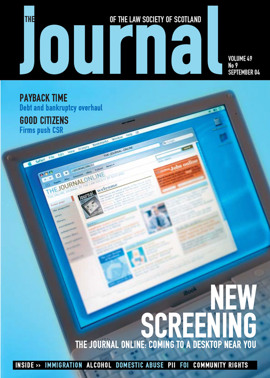Profession's voice must be heard
August for Edinburgh means the excitement of the Festival – but for your intrepid President it meant the thrill of hanging around airport lounges en route to the American Bar Association (ABA) and Canadian Bar Association (CBA) conferences. Sadly, you can now spend longer in airports waiting for connections than crossing the Atlantic.
Thankfully the journeys were well worth it and I can report that I have been hard at work in my ambassadorial role, promoting Scots solicitors abroad. The conferences also provided a great opportunity to share business experiences with our transatlantic cousins. There was much to learn but it was immensely reassuring to hear once again of the high regard in which the Scottish profession is held internationally.
Perhaps it should be no surprise that many of the same issues are at the top of the profession’s agenda across the pond, especially in Canada. Susan McGrath, the incoming CBA President is a sole practitioner from Iroquois Falls in North Ontario (remember Neil Young). In her inaugural address she highlighted three issues for her presidency: the appointment system to the Canadian Supreme Court; legal aid; and the problems facing the sole practitioner. Other major features of the CBA conference were the law as it applies to lawyer-client privilege, work-life balance, IT and pro bono – all familiar issues in Scotland.
However, dominating both conferences was the importance of encouraging a more favourable image of lawyers and persuading the profession to promote the vital role which lawyers, exercising their professional responsibilities, have in society. Lawyers are guardians of the rule of law, which gives life to the individual rights at the core of modern democracy. The legal system binds all individuals, institutions and governments to democracy, which depends on laws which are known and which enshrine the concepts of human rights – especially the right to a fair trial before an impartial and independent tribunal.
In her opening address to the ABA, Governor Jennifer Granholm of Michigan urged lawyers to aspire to greatness in their calling and to be proud of the vital public service we provide. She also gave a timely reminder of the professional duties solicitors carry, which mean that it is not enough for lawyers to be guided by “the best interests of the client”.
That balance of professionalism and clients’ interests is the focus of much of the work of the Society’s Conveyancing Committee, with the aim of ensuring that the Scottish conveyancing process operates in the best interests of purchasers and sellers. As a practical step, the Committee is already progressing the idea of standard missives. Already operating successfully in Inverness and Dundee, the aim is for local practitioners to agree a form of missives which strike a balance between purchaser and seller, reduce the time taken to conclude missives and increase clients’ faith in the benefits of the Scottish system.
Technology and the future world for lawyers was the subject chosen by Tod Maffin, a self confessed “anorak” and “geek with charisma”, for his illuminating and entertaining tour de force presentation at the close of the CBA. He anticipated the impact of privacy-invading camera phones and changes to defamation induced by the trend for self-publishing tools known as blogs. (“Scots law blogs” produced 732 hits on Google when I checked – although “blog” isn’t in my Microsoft dictionary.)
Looking into the not-too-distant future, he described a prospective demographic crisis. Transposing his statistics to the Scottish legal market: in many firms, the average age of partners is late 40s-early 50s and for in-house lawyers similar average ages apply to those in mid- or senior management positions. Given that there is massively reduced employee or partner loyalty, his suggestion that to prosper, businesses need to address succession issues, is timely and I would urge members to consider this now.
Current international issues and cases led me to ask Council to debate the extent to which the Society should become involved with individual cases by signing amicus curiae briefs or comment on international breaches of the rule of law. I am confident that Council took the correct decision. After an excellent debate, Council agreed its policy that the Society will not comment on individual cases at home or abroad but will seek to comment on important matters of principle arising from individual cases particularly in support of the rule of law and the role of lawyers. Which just goes to show that we Scots are happy to learn from others and listen to their views, but we have independence of mind, that fundamental trait of a good lawyer.
In this issue
- Profession's voice must be heard
- Let the cameras speak
- Vision on
- Forgive us our debts
- Written down
- DAS: the broader picture
- A lost message
- For the greater good
- Start your engines
- Are you covered?
- Opportunity knocks
- Rock bottom?
- BAILII looks for help
- On level ground
- Taking freedom seriously
- Taking out abuse
- Be ready for the options hearing
- Now it's collaborative
- Winning around a table
- Website reviews
- Scottish Solicitors' Discipline Tribunal
- Book reviews
- Beware all conveyancers!
- A-day looms closer






